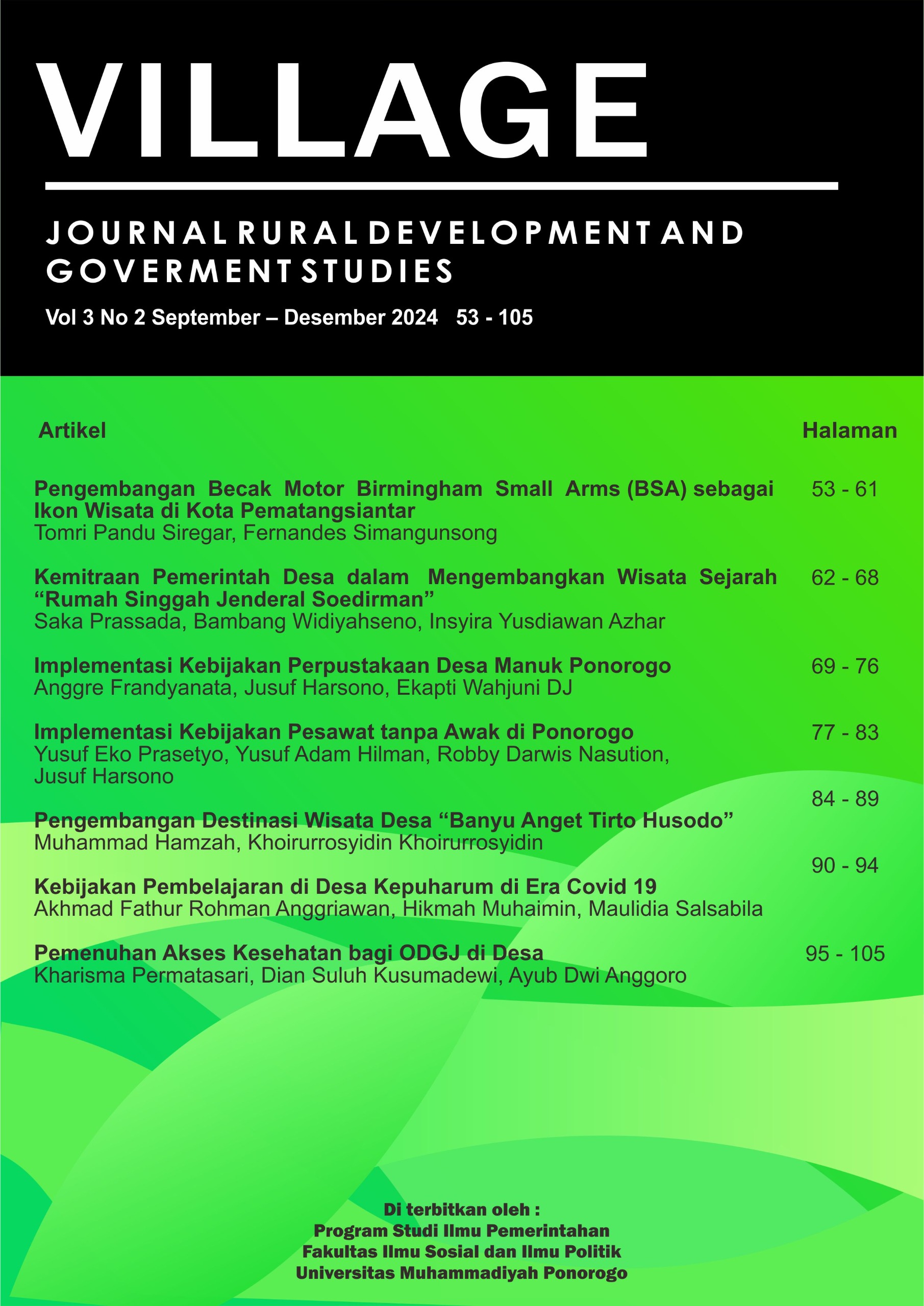Kebijakan Pembelajaran di Desa Kepuharum di Era Covid 19
DOI:
https://doi.org/10.24269/vlg.v3i2.5881Abstract
Corona virus was first identified as the common cold in 1960 according to its history. Many initially suspected that the corona virus was transmitted from animals to humans. It was later discovered that this virus was also transmitted from human to human. Covid-19 spread very quickly to countries in the world and began to spread at the end of December 2019 in the city of Wuhan. Learning is a process of interaction between students and educators and learning resources in a learning environment. Learning is assistance provided by educators so that the process of acquiring knowledge and knowledge, mastering skills and character, and forming attitudes and beliefs in students can occur. In other words, learning is a process to help students learn well. Online learning is learning that is done online, using learning applications and social networks. Online learning is learning that is done without face-to-face, but through an available platform. All forms of subject matter are distributed online, communication is also carried out online, and tests are also carried out online. This online learning system is assisted by several applications, such as Google Classroom, Google Meet, Edmudo and Zoom. Face-to-face learning is a learning process that is carried out directly / face to face between students and teachers in schools. While limited PTM is face-to-face learning carried out in schools with certain limitations such as the number of students and teachers, and also the length of study in school. From the data obtained in the field, students prefer face-to-face learning, because they can meet their friends and easily understand when studying at school, the application of online learning is considered less effective in providing learning materials, while face-to-face learning has been implemented in Indonesia, especially in Indonesia. SDN Kepuharum is considered very effective in providing learning materials.
References
Dasar, D. S. (2022). No TitleSemua Sekolah Wajib Melaksanakan PTM Terbatas pada 2022. Direktorat Sekolah Dasar. https://ditpsd.kemdikbud.go.id/artikel/detail/semua-sekolah-wajib-melaksanakan-ptm-terbatas-pada-2022
Marbun, P., Pembelajaran, M., & Efektif, P. (2020). Disain Pembelajaran Online pada Era dan Pasca Covid. CSRID Journal, 12(2), 129–142.
Misti Prihatini. (2022). Pembelajaran Tatap Muka Terbatas di Kota Mojokerto Mulai 30 Agustus. Berita Jatim.Com. https://beritajatim.com/pendidikan-kesehatan/pembelajaran-tatap-muka-terbatas-di-kota-mojokerto-mulai-30-agustus/
Nissa, S. F., & Haryanto, A. (2020). Implementasi Pembelajaran Tatap Muka Di Masa Pandemi Covid-19. Jurnal IKA PGSD (Ikatan Alumni PGSD) UNARS, 8(2), 402. https://doi.org/10.36841/pgsdunars.v8i2.840.
pengelola web kemdikbud. (2022). SKB 4 Menteri Terbaru Atur Pembelajaran Tatap Muka Seratus Persen. Kementerian Pendidikan Dan Kebudayaan. https://www.kemdikbud.go.id/main/blog/2022/05/skb-4-menteri-terbaru-atur-pembelajaran-tatap-muka-seratus-persen
Rohana, S. (2020). Model Pembelajaran Daring Pasca Pandemi Covid-19. At-Ta’dib: Jurnal Ilmiah Prodi Pendidikan Agama Islam, 192. https://doi.org/10.47498/tadib.v12i02.441
Sabiq, A. F. (2020). Persepsi Orang Tua Siswa tentang Pembelajaran Tatap Muka pada Era New Normal Pandemi Covid-19. Journal of Islamic Education Research, 1(3), 179–189. https://doi.org/10.35719/jier.v1i3.41
Salma. (2020). 7 Macam Teori Pembelajaran Serta Pembahasannya. Tambah Pinter.Com. https://tambahpinter.com/teori-pembelajaran/#:~:text=Pengaruh Media Elektronik-,Pengertian Teori Pembelajaran,yang diperoleh dari proses belajar
Downloads
Published
Issue
Section
License
Penulis yang mempublikasikan naskahnya pada Jurnal ini menyetujui ketentuan berikut:
Hak cipta pada setiap artikel adalah milik jurnal.
- Penulis mengakui bahwa VILLAGE : Journal Rural Development And Goverment Studies berhak sebagai mempublikasikan pertama kali dengan bekerja secara bersamaan dibawah Creative Commons Attribution License yang memungkinkan orang lain untuk membagi pekerjaan dengan pengakuan dari pengarang dan publikasi pertama dalam VILLAGE : Journal Rural Development And Goverment Studies;
- Penulis dapat memasukan tulisan secara terpisah, mengatur distribusi non-ekskulif  dari naskah yang telah terbit di jurnal ini kedalam versi yang lain (misal: dikirim ke respository institusi penulis, publikasi kedalam buku, dll), dengan mengakui bahwa naskah telah terbit pertamakali pada VILLAGE : Journal Rural Development And Goverment Studies;
- Penulis diperbolehkan dan didorong untuk mengirimkan pekerjaan mereka secara daring (misal melalui respositories atau website instansi penulis) sebelum atau selama proses pengiriman pada VILLAGE : Journal Rural Development And Goverment Studies berlangsung, ini dapat menjadikan pertukaran informasi yang sangat produktif, dan serta menjadikan kutipan yang banyak dari publikasi;
- Setiap naskah yang diterima wajib menyertakan Perjanjian Pemindahan Hakcipta (Copyright Transfer Agreement/CTA), sebelum artikel diterbitkan. CTA dapat diunduh di sini

